In this post, I’ll explain how to set up AI Search tracking in Google Analytics 4 to view the difference between AI Search traffic compared to Google Search and organic search overall. I’ll also explain how ignoring Google Search could lead to a drop in quality, which could cause problems with Google’s broad core updates (as core updates can impact all areas of Google including AI Overviews and AI Mode).

AI search is here, it’s growing, and you can’t miss article after article about the death of SEO, organic search, Google search traffic, etc. It’s a little out of control right now… Sure, AI Search traffic from tools like ChatGPT, Perplexity, Gemini, etc., will continue to grow, but if you look at the actual data, organic search (and Google Search in particular) still drives a majority of traffic to most websites.
Even though that’s been documented, I’m finding many people either believe otherwise or are overly focusing on AI Search in the short term (and ignoring Google). I think that’s a big mistake and wanted to quickly cover the traffic differences now and the longer-term risks associated with ignoring Google.
And in case you are new to my blog, I covered two years ago how AI Search will eventually lead to Jarvis – a personal AI assistant that knows everything about you, your likes, dislikes, your health, your travels, and more, and can make customized recommendations for you in real-time. Jarvis will be ambient, seeing what you see, experiencing what you experience, and will be always looking to help. But… we aren’t there yet and site owners should not ignore important channels in the short-term.
A Recent AI Search Conversation with an IT executive:
I was at a party this past weekend having a conversation with an IT executive about the topic of AI Search, the future of Google Search, the great decoupling of clicks and impressions, and more. I could tell he had read some articles about Search but he wasn’t too close to what’s been going on in the field. His view was a bit extreme, heavily ‘doom and gloom’, and without having any data to back it up. It was a great conversation but I felt he wasn’t fully informed about how most sites received traffic (and how much from each source).
About ten minutes into the conversation, I asked how much traffic he thought AI Search led to sites now in June 2025. For example, combined traffic from ChatGPT, Perplexity, Gemini, Claude, etc. He took a few seconds and came back with “30-40%?”I immediately explained it was less than 1%, and for many sites I have access to it’s actually under .5%. He was surprised and said, “Well, maybe things have been overblown a bit in the news…”
You can say that again!
After that conversation, I thought it would be helpful for site owners and marketers to make sure they understood how much traffic AI Search is driving to their own sites now in June 2025. And beyond that, understand how that compares to Google and organic search overall. Then based on the data, make sure they don’t ignore important sources of traffic (which for many is Google Search).
The risk of ignoring Google could end up impacting rankings across search features like AIOs, the 10-blue links, featured snippets, image search, video mode, Google News, Discover, and even AI Mode (which is the future of Search according to Google). I’ll cover more about this soon.
Tracking AI Search in GA4, Miniscule Numbers, and a Major SEO Risk:
The conversation I covered earlier, and several others I’ve had like it, led me to set up better GA4 tracking for AI Search across even more sites. I ended up finding an outstanding tutorial from Dana DiTomaso which explains step-by-step how to set up a custom channel group for AI Search. Once set up, it was easy to compare the AI Search channel to other key channels for your site. In addition, Dana explains how to quickly set up a custom report that shows traffic and trending from the channel overall, but also from each AI Search tool like ChatGPT, Perplexity, Gemini, etc.
Here is Dana’s tutorial:
And the more I checked, the more I saw miniscule numbers (under 1% with many under .5%). Again, I know AI search traffic will grow, and I’m not saying AI search isn’t important to focus on, but I think site owners run the risk of missing the forest for the trees by heavily focusing on AI search right now and ignoring Google Search. And maybe not just ignoring Google Search but implementing tactics that could actually hurt SEO (and even severely). I’ll come back to that later in the post.
For now, here are several different sites across verticals and sizes. Below, you can see traffic from AI Search versus other channels. I think you’ll get the picture very quickly. And it matches a recent study that explained AI Search was driving less than 1% of traffic to most sites across the web (at least now).
Below, you will first see the amount of traffic per channel. AI Search is a very small percentage across each site.
Site 1: B2C
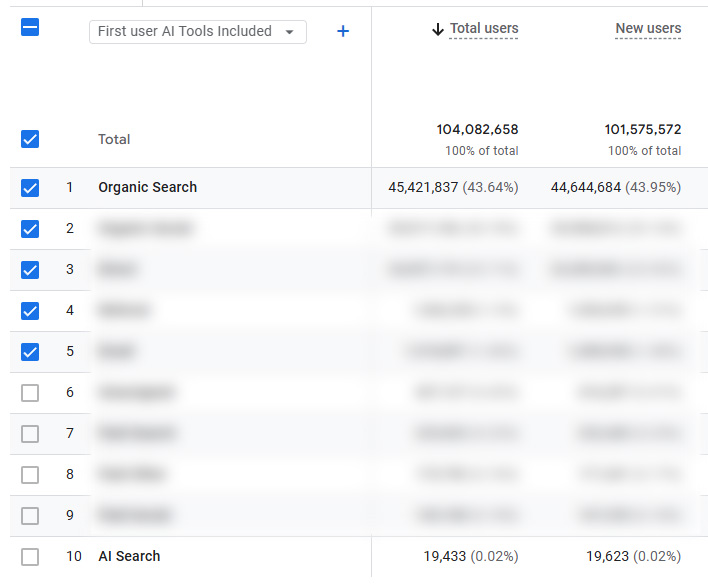
AI Search trending (up, but still a tiny piece of traffic):

Organic Search trending (the top driver of traffic for the site):
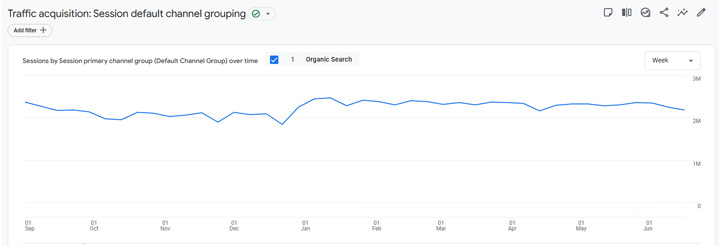
Site 2: News publisher (niche)
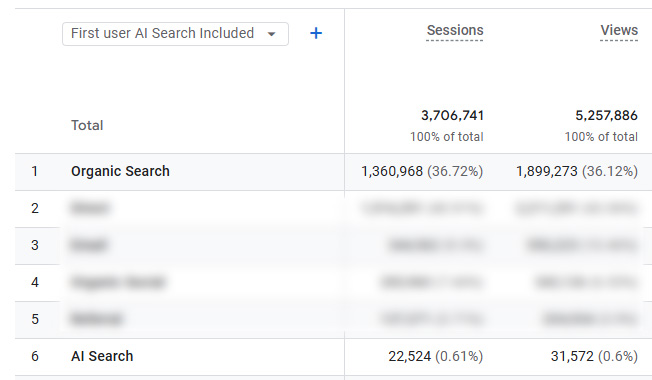
AI Search trending (again, up but still a very small percentage of traffic):
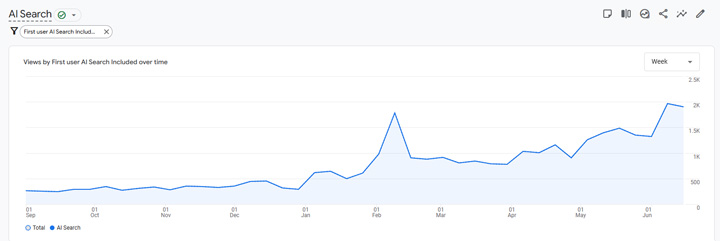
Organic search trending (the leading driver of traffic for the site):

Site 3: Health/Medical
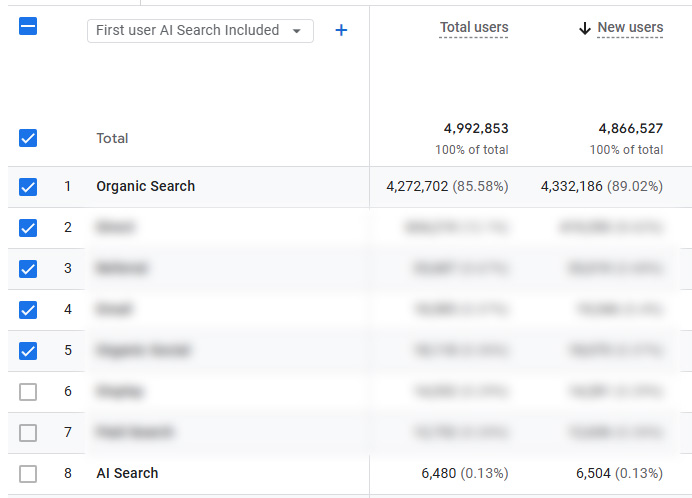
AI Search trending (not really trending up like the others and still a tiny percentage of traffic for the site):
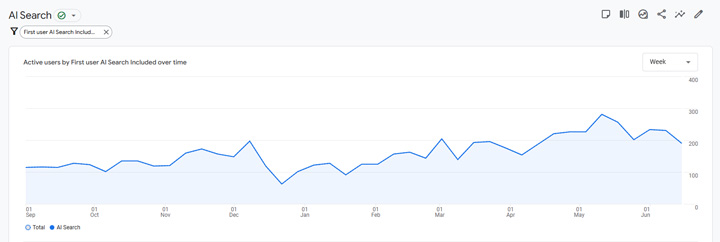
Google organic search trending (the vast majority of traffic for the site):
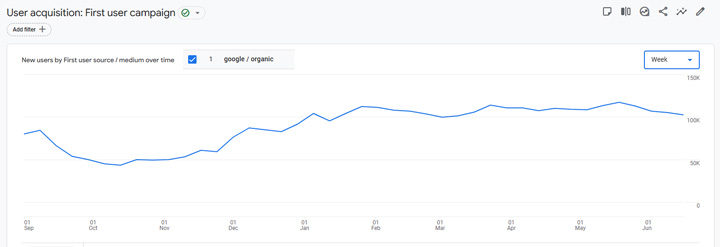
Site 4: And finally, how about a smaller site focused on a niche vertical?
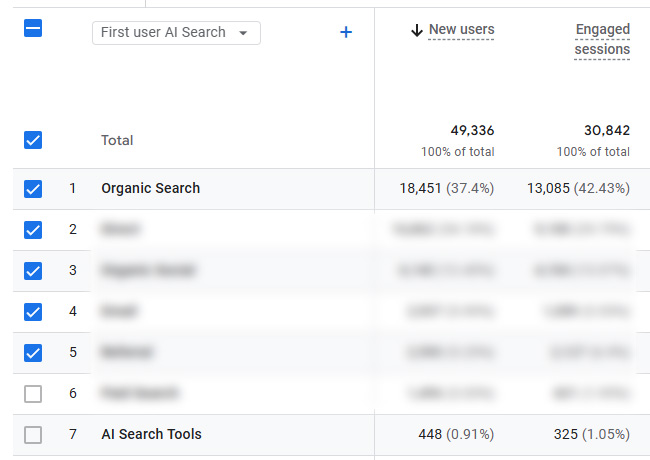
AI Search trending (up, but a very small percentage of total traffic):
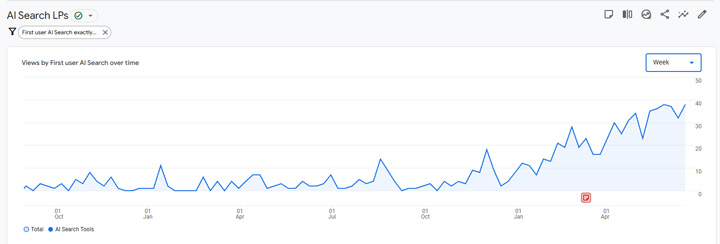
Organic search trending (stable and the largest driver of traffic to the site):
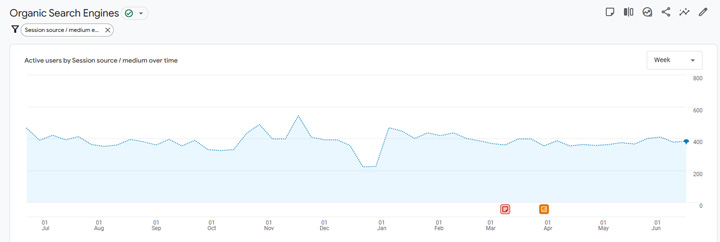
As you can see across sites and verticals, AI Search is a tiny piece of traffic in June 2025. Yes, it will grow, but Google Search, and organic search overall, is a majority of traffic for most sites. I’ll cover the risk of ignoring this next.
Ignore Google Search at your own peril: Broad core updates can impact all of Search, including AIOs, AI Mode, and much more:
I might write a post covering this topic in greater detail, but I wanted to quickly cover it here first. There’s a lot of talk about the great decoupling and traffic dropping for sites due to AI Overviews (and soon AI Mode). But the fact of the matter is that Google still drives the most traffic to sites by a mile. So if site owners start focusing on AI Search and ignoring Google, then potential problems could creep in quality-wise.
And by the way, a strong and balanced SEO strategy should have already been covering much of what you need for AI Search. Rand Fishkin wrote a great article about that recently. And Lily Ray followed up yesterday with a great post of her own discussing why the rise of AI Search does NOT mean the death of SEO. She also covers why the recommendations she is seeing for AI Search are EXACTLY what many SEOs have been recommending for years.
Here is a great section from Lily’s post:
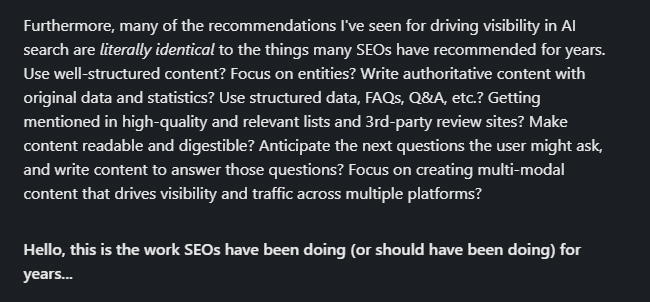
Next, based on the articles being written about AI Search, how to rank in LLMs, etc., some site owners may be completely changing how they write content, some might be using AI-generated content to fill gaps based on LLM visibility tracking tools, they might be ignoring quality overall for a site, not focusing on providing a strong UX and ad situation, not focusing on strong technical SEO, and more. And for sites going down that path and ignoring Google, they run the risk of letting quality issues creep in. If that happens over time, they become susceptible to getting impacted by a broad core update down the line.
If that happens, AI Overviews can be impacted, rankings in the 10-blue links could be impacted, featured snippets could be impacted, Discover can be impacted, image and video search can be impacted, Google News and Top Stories can be impacted, and even AI Mode can be impacted. All of these are search features that can be impacted by major algorithm updates like broad core updates. And if you’re wondering if AI Overviews and AI Mode can actually be impacted by broad core updates, the answer is YES. Google confirmed that AIOs can be impacted after I shared about that last year.
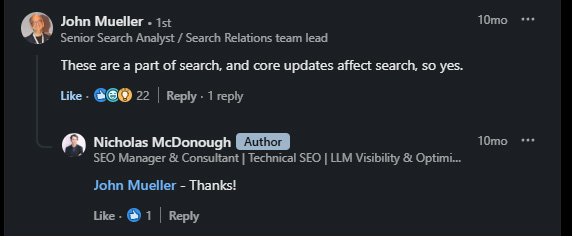
And for AI Mode, Google has also explained that AI Mode is rooted in its core quality and ranking systems. So yes, core updates can impact AI Mode results. Google’s fan out approach within AI Mode triggers multiple queries, so the results for those queries that AI Mode is retrieving can absolutely be impacted by core updates.
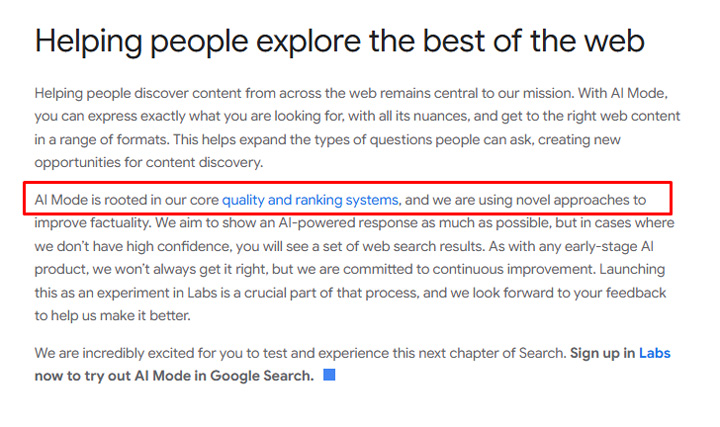
So site owners may be chasing rankings in LLMS and ignoring the top driver of traffic now. If that happens, site owners might be wishing for those rankings in AIOs or AI Mode again versus complaining about them.
Set up AI Search tracking and reference your own GA4 data to see what I’m talking about traffic-wise.
And if you are impacted by a broad core update, you might have months of remediation work to improve “quality” and then Google will need to see those improvements in place over the long-term. Only then, and usually during a subsequent broad core update, will you have a chance at recovery. So you might drop in the 10-blue links, AIOs, featured snippets, image search, video mode, Top Stories, Google News, Discover, and even AI Mode if this happens.
Unfortunately, I feel like we are going to see this happen with sites ignoring Google Search in the short term and instead implementing unproven tactics with the hope of improving visibility in AI Search like ChatGPT, Perplexity, Gemini, Copilot, and more. And again, read Rand’s post and Lily’s post about how your SEO strategy should have already been covering AI Search.
AI Search is growing but Google Search is still incredibly important for traffic and revenue – at least until Jarvis arrives.
Moving forward, I highly recommend setting up GA4 tracking today for AI Search, viewing the amount of traffic from AI Search, and comparing that to other sources of traffic like Google Search and organic search overall. Then make sure you don’t miss the forest for the trees by overly focusing on AI Search over other important sources of traffic like Google. Remember, letting quality problems creep in can cost site owners dearly when broad core updates roll out.
By the way, definitely ping me on social media or send me an email once you set up GA4 tracking for AI Search. Most sites I’m checking are under 1% for AI Search with many under .5%. I’d love to hear about what you are seeing!
GG

